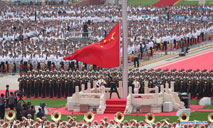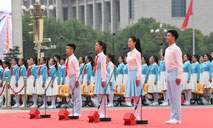Interview: China-Africa cooperation has revitalized war against malaria: WHO official
NAIROBI, July 2 (Xinhua) -- The realization of zero malaria status by African countries by 2030 could be within reach thanks to technical support provided by China to help combat the tropical disease, a World Health Organization (WHO) official has said.
Akpaka Kalu, Team leader, Tropical and Vector-borne Diseases Program at WHO Regional Office for Africa said strategic collaboration with China has reinvigorated the continent's battle with malaria.
"We are proud of China's support in the fight against malaria in Africa. The greatest fruit of our collaboration is the willingness of China to offer support that is adaptable to our local context," Kalu said during a virtual interview on Friday.
The World Health Organization (WHO) on Wednesday officially granted China a malaria-free certification as a token of celebration of the country's successful elimination of the disease after decades of struggle against malaria.
Kalu said that Africa has benefitted from the 1-3-7 strategy that China implemented successfully, paving way for the official declaration of the Asian Nation's malaria-free status by WHO on June 30.
According to Kalu, the strategy that underscores reporting a malaria case on day one, confirming a case after three days and halting the spread of the vector-borne disease on the seventh day, has been implemented in Tanzania with resounding success.
He said China helped Tanzania implement the 1-3-7 strategy from 2016 to 2018, resulting in an 80 percent reduction in malaria cases at a high burden district.
Kalu said the Chinese model of fighting malaria will also be implemented in three other African countries including Burkina Faso, Senegal and Zambia.
"The aim is to look at the impact of this strategy and if it works, we will see whether it can be adopted in additional countries and help the continent achieve malaria-free status by 2030," said Kalu.
He said that African health experts have benefitted from training provided by China to boost their understanding of malaria control and treatment interventions.
Kalu said that before the onset of the COVID-19 pandemic, African policymakers in charge of malaria control programs used to visit China for training on how to combat the disease effectively.
"The training has always targeted custodians of malaria control in health ministries. People who make policies have been learning about the Chinese strategy of fighting malaria," said Kalu.
He said Sino-Africa cooperation on malaria fight has laid emphasis on identifying, investigating, testing and treating the disease in high burden localities.
Kalu said the collaboration has also focused on comprehensive malaria treatment that is integrated into Africa's public health systems to help realize sustainability.
He said that the future of China-Africa cooperation in the war against malaria has bright prospects amid willingness from both sides to share knowledge, experience and expertise required to combat the disease effectively.
"In future, Chinese experts can be deployed to Africa to train and mentor us on how to eliminate malaria," said Kalu, adding that total eradication of the disease in the continent can be realized subject to the availability of a vaccine, new therapeutics and universal access to insecticide-treated nets.
Kalu said that a high burden of malaria has derailed Africa's socio-economic progress hence the need for the continent to adopt new preventive and curative interventions.
According to Kalu, Africa loses an estimated one percent of its gross domestic product (GDP) to malaria annually while the disease is to blame for high school absenteeism among children.
He said that Africa accounts for more than 94 percent of the global malaria burden and in 2019 alone, 215 million cases and 384,000 deaths arising from the disease were reported in the continent.
Photos
Related Stories
- Senior WHO official congratulates China for getting malaria-free certificates
- WHO officially declares China malaria-free
- EU, WHO launch new tool for pandemic contact tracing
- Wuhan lab leak hypothesis "flawed": WHO investigator
- WHO studying evidence of coronavirus antibodies found in Italy dating back to late 2019
- Peng Liyuan addresses opening of WHO meeting on TB, AIDS
- Italy confirms WHO asks for re-checks of research on when coronavirus first surfaced
- WHO asks for rechecking research on possible COVID-19 origin
- WHO expert rules out man-made origin of COVID-19
- Philippines lauds WHO approval of China's Sinovac COVID-19 vaccine
Copyright © 2021 People's Daily Online. All Rights Reserved.










